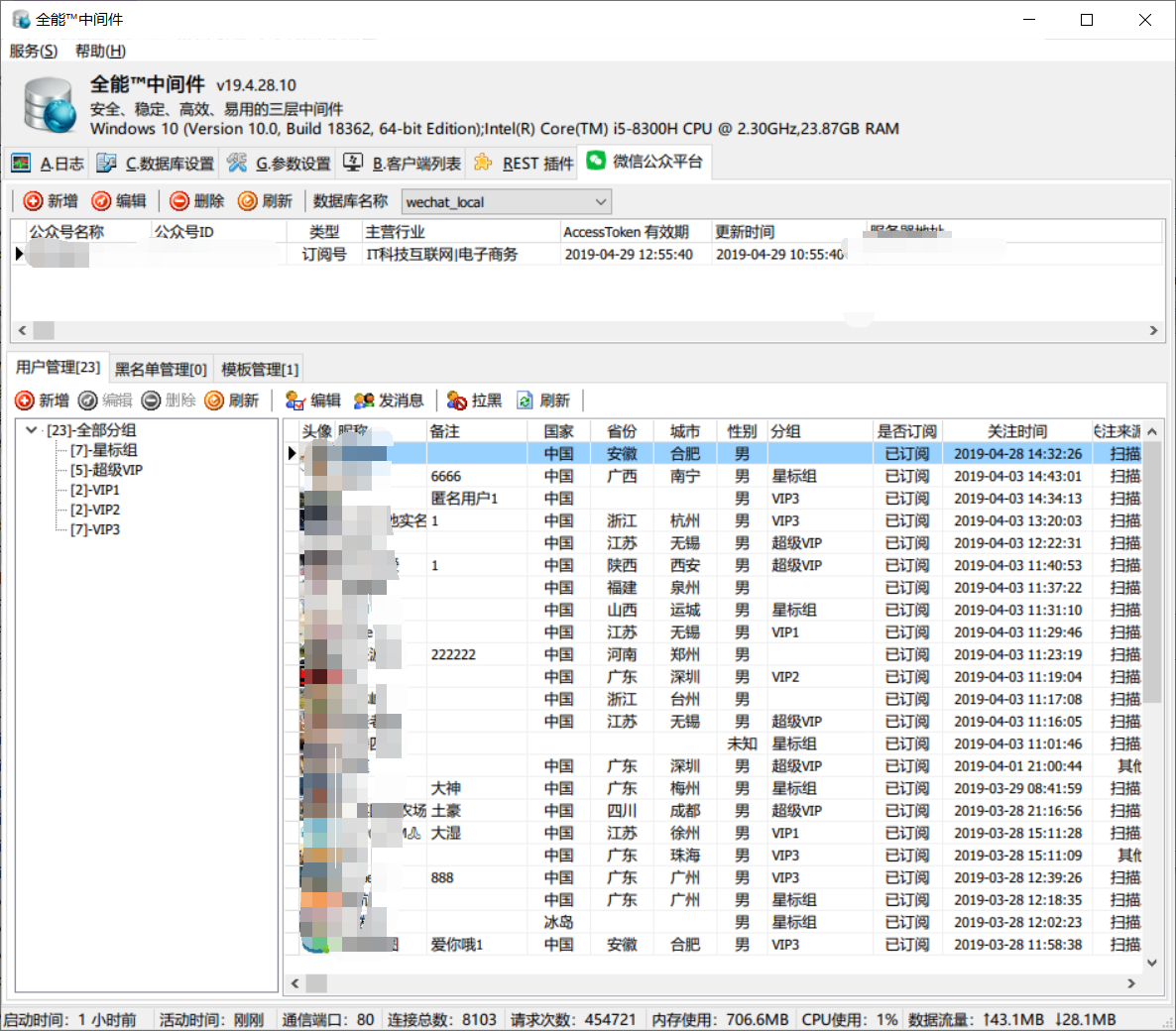一、用户标签管理
开发者可以使用用户标签管理的相关接口,实现对公众号的标签进行创建、查询、修改、删除等操作,也可以对用户进行打标签、取消标签等操作。
1、创建标签
/// <summary> /// 创建标签 /// </summary> /// <remarks> /// 一个公众号,最多可以创建100个标签。 /// </remarks> function CreateTag(const ATagName: string): TWechatTag;
function TWechatRequest.CreateTag(const ATagName: string): TWechatTag; var Content, Response: TJSONObject; begin Result := nil; Content := TJSONObject.Create.AddPair('tag', TJSONObject.Create.AddPair('name', ATagName)); try Response := HttpPost(Content, 'tags/create'); try if ParseResponse(Response) then begin Result := TJson.Json2Object<TWechatTag>(Response.Values['tag'].ToJSON); Result.Count := 0; end; finally FreeAndNil(Response); end; finally FreeAndNil(Content); end; end;
2、获取标签
/// <summary> /// 获取公众号已创建的标签 /// </summary> function GetTags: TWechatTags;
function TWechatRequest.GetTags: TWechatTags; var JsonString: string; Response: TJSONObject; begin Response := HttpGet('tags/get'); try if ParseResponse(Response) then begin JsonString := Response.GetValue<TJSONArray>('tags').ToJSON; Result := TJson.Json2Object<TWechatTags>(JsonString); end; finally FreeAndNil(Response); end; end;
3、删除标签
/// <summary> /// 删除标签 /// </summary> /// <remarks> /// 当某个标签下的粉丝超过10w时,后台不可直接删除标签。 /// 此时,开发者可以对该标签下的openid列表 , /// 先进行取消标签的操作,直到粉丝数不超过10w后,才可直接删除该标签。 /// </remarks> function DeleteTag(ATagId: Integer): Boolean;
function TWechatRequest.DeleteTag(ATagId: Integer): Boolean; var Content, Response: TJSONObject; begin Content := TJSONObject.Create.AddPair('tag', TJSONObject.Create.AddPair('id', TJSONNumber.Create(ATagId))); try Response := HttpPost(Content, 'tags/delete'); try Result := ParseResponse(Response); finally FreeAndNil(Response); end; finally FreeAndNil(Content); end; end;
4、编辑标签
/// <summary> /// 编辑标签 /// </summary> function UpdateTag(ATagId: Integer; ANewName: string): Boolean;
function TWechatRequest.UpdateTag(ATagId: Integer; ANewName: string): Boolean; var Content, Response: TJSONObject; begin Content := TJSONObject.Create.AddPair('tag', TJSONObject.Create .AddPair('id', TJSONNumber.Create(ATagId)) .AddPair('name', ANewName) ); try Response := HttpPost(Content, 'tags/update'); try Result := ParseResponse(Response); finally FreeAndNil(Response); end; finally FreeAndNil(Content); end; end;
二、设置用户备注名
/// <summary> /// 设置用户备注名 /// </summary> /// <remarks> /// https://mp.weixin.qq.com/wiki?t=resource/res_main&id=mp1421140838 /// </remarks> function UpdateRemark(const AOpenID, ARemark: string): Boolean;
function TWechatRequest.UpdateRemark(const AOpenID, ARemark: string): Boolean; var Content, Response: TJSONObject; begin Content := TJSONObject.Create.AddPair('openid', AOpenID).AddPair('remark', ARemark); try Response := HttpPost(Content, 'user/info/updateremark'); try Result := ParseResponse(Response); finally FreeAndNil(Response); end; finally FreeAndNil(Content); end; end;
三、获取用户基本信息(UnionID机制)
在关注者与公众号产生消息交互后,公众号可获得关注者的OpenID(加密后的微信号,每个用户对每个公众号的OpenID是唯一的。对于不同公众号,同一用户的openid不同)。公众号可通过本接口来根据OpenID获取用户基本信息,包括昵称、头像、性别、所在城市、语言和关注时间。
请注意,如果开发者有在多个公众号,或在公众号、移动应用之间统一用户帐号的需求,需要前往微信开放平台(open.weixin.qq.com)绑定公众号后,才可利用UnionID机制来满足上述需求。
UnionID机制说明:
开发者可通过OpenID来获取用户基本信息。特别需要注意的是,如果开发者拥有多个移动应用、网站应用和公众帐号,可通过获取用户基本信息中的unionid来区分用户的唯一性,因为只要是同一个微信开放平台帐号下的移动应用、网站应用和公众帐号,用户的unionid是唯一的。换句话说,同一用户,对同一个微信开放平台下的不同应用,unionid是相同的。
/// <summary> /// 获取单个用户基本信息 /// </summary> function GetUserInfo(const AOpenID: string): TWechatUser;
function TWechatRequest.GetUserInfo(const AOpenID: String): TWechatUser; var Response: TJSONObject; begin Result := nil; Response := HttpGet('user/info', Format('openid=%s&lang=zh_CN', [AOpenID])); try if ParseResponse(Response) then Result := TWechatUser.FromJsonString(Response.ToJSON); finally FreeAndNil(Response); end; end;
上张效果图
